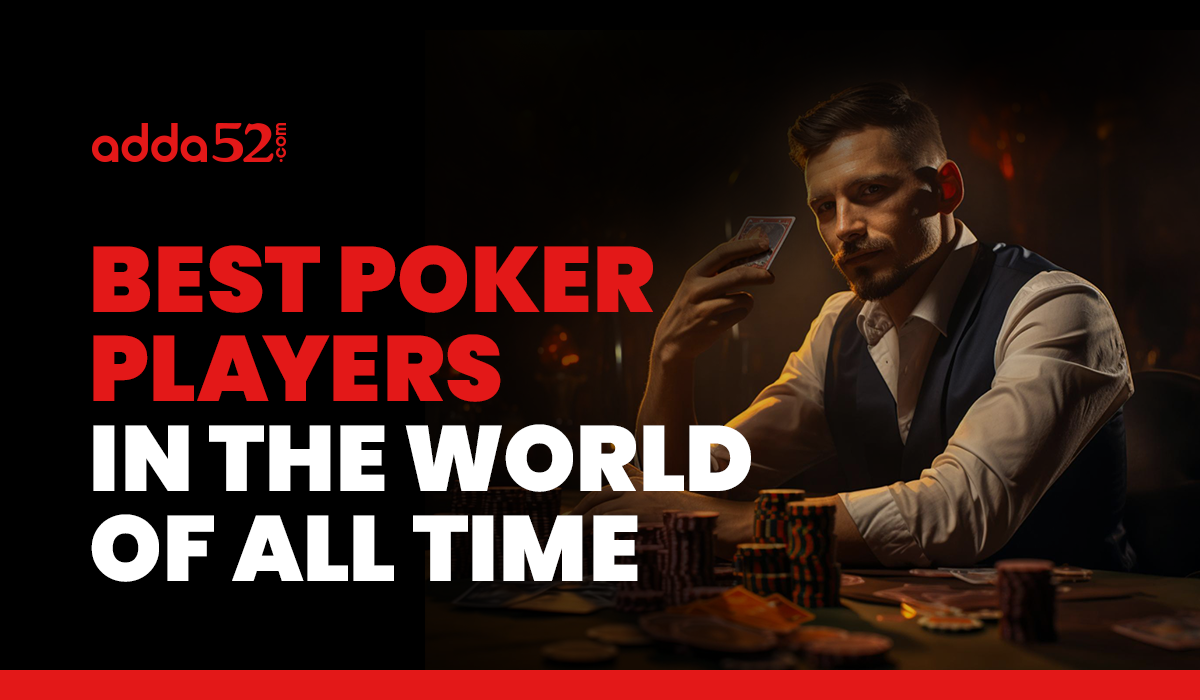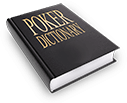Best Poker Players In The World Of All Time

Introduction
Poker, a game where that relies on skills and strategy has had many amazing players over time.
In this blog, we will be taking a look at some of the top poker players in the world and their achievements.
Popular Poker Players
Poker is liked by many people and seen as a game of skill, not luck. It can be a promising profession for skilled players.
Many pro poker players in India participate in live tournaments and online games. The triumph of Indian players in global Poker games boosted the game's fame locally.
Here is a list of some of the most popular professional Poker Players of all time:
|
Sr No. |
Name |
Current Rank at All Time Money List |
|---|---|---|
|
1 |
Bryn Kenney |
1th |
|
2 |
Justin Bonomo |
2nd |
|
3 |
Stephen Chidwick |
3rdh |
|
4 |
Daniel Negreanu |
7th |
|
5 |
Erik Seidel |
9th |
|
6 |
Phil Ivey |
11th |
|
7 |
Fedor Holz |
12th |
|
8 |
Phil Hellmuth Jr |
24th |
|
9 |
Antonio Esfandiari |
27th |
|
10 |
Bertrand Grospellier |
73rd |
Best Global Poker Players
Daniel Negreanu
Daniel Negreanu is one of the world’s most skilled poker players. Having started playing in the year 1997, he has blazed his way through the world of professional poker, with $21 million in winnings and six bracelets WSOP bracelets.
- Current Rank at All Time Money List: As of November 2023, Daniel Negreanu is the third-biggest live tournament poker winner of all time.
- Total live cash: $42,000,000
- Current Rank at All Time Money List: 6th
Phil Ivey
Phil Ivey is a well-known American poker pro, famous for his skills and many accomplishments in the poker industry. Ivey won ten WSOP bracelets, cementing his place as a poker master. But his successes don’t just stop at WSOP. He also won a World Poker Tour (WPT) event and earned $23 million from live tournaments. Ivey also helped create the Full Tilt Poker site online and was its spokesperson for seven years.
- Total live cash: $42,000,000
- Notable Wins: Ivey has triumphed in high-stakes tournaments, including the $2,500 No-Limit 2–7 Draw Lowball Event and the $2,500 1/2 Seven Card Stud Hi/Lo 1/2 Omaha Hi/Lo event.
- Current Rank at All Time Money List: 12th
Fedor Holz
Fedor Holz is a well-known German poker player. He excels in high-stakes games and influences the poker scene greatly. Holz has earned more than $32 million in poker tournaments, proving he is very good at the game. He is well-known for concentrating on high-stakes tournaments. In those games, he has repeatedly shown outstanding talent and strategic ability.
- Total live cash: $40.2 Million
- Current Rank at All Time Money List: 11th
Justin Bonomo
Justin Bonomo is a famous poker player with great success in poker. He has won more than $48 million in live tournaments. This impressive accomplishment places him among the top earners in poker history.
2018 was a great year for Bonomo. He won over $25 million, got many titles, and solidified his status as one of the top players. From 2008 to January 2010, Bonomo represented Team Bodog, a famous poker brand.
- Total live cash: $29,000,000
- Current Rank at All Time Money List: 2nd
Phil Hellmuth Jr
Phil Hellmuth Jr. is famous in poker for his impressive successes. Hellmuth has won the most World Series of Poker bracelets, with a total of 15 to his name. This shows his great skill and consistency in poker.
In 1989, he won the main event, a big achievement that helped establish him as one of the best poker players ever. Hellmuth has won over $21.75 million in live tournaments. He is successful in WSOP and other big poker events, proving he is a top player.
- Total live cash: $29,000,000
- Current Rank at All Time Money List: 23rd
Best Poker Players in India
Vivek Rajkumar
Vivek Rajkumar is an Indian American Poker player. He won the WPT Borgata Poker Open ME and bagged $1,424, 500 in 2008. His other notable achievements include winning the 2008 L.A. Poker Classic $2500 NLH event and the 2009 L.A. Poker Classic $9,900 NLH event. His total live earnings are $8,080,012.
- Indian All-Time Money List - 1st
- Current Rank at All Time Money List - 152nd
- Best Live Cash - $3,652,345
- Total Online Earnings - $529,382
- Popularity Ranking - 226th
Santosh Suvarna
Santhosh Suvarna is an important person in the poker world. He used to run Rockets Poker Room in Bengaluru and is now in Dubai. Suvarna is famous for helping the industry and has $6 million in 2024, as per Gutshot Magazine. He succeeded by winning a poker tournament and earning $1,772,000.
- Current Rank at All Time Money List - 2nd
- Total live cash - $7,080,741
- Best Live Cash - $1,772,000
Nipun Java
Born and brought up in New Delhi, Nipun Java resides in the US. This well-established Indian Poker player has been playing the game professionally since 2009. In 2017, Nipun Java and Aditya Sushant won a special poker award from WSOP in India. His total live earnings are $2,901,359.
- Indian All-Time Money List - 3rd
- Current Rank at All Time Money List - 656th
- Best Live Cash - $270,509
- Global Poker Index Ranking - 921
- Popularity Ranking - 452
Ankit Ahuja
Ankit Ahuja is a business and tech consultant. Ankit Ahuja, ranked sixth, is a business and tech consultant. He has done well in many poker tournaments, making over $1.2 million in his live poker career.
- Indian All-Time Money List - 4th
- Current Rank at All Time Money List - 1930th
- Best Live Cash - $330,134
- Global Poker Index Ranking - 307
- Popularity Ranking - 6,652
Abhinav Iyer
Mumbai-based Abhinav Iyer is the first solo WSOP bracelet winner from India. In 2019, he claimed the gold bracelet and $565,346 prize money at WSOP’s The Closer event. The same year, he won the APT Vietnam Main Event and earned a whopping $98,055. At the WPT India 2019 High Roller, he finished in 12th position for INR 3,04,680. In January 2020, he finished in 73rd position in IPC's p 5o,000 NLH Main Event. His total live real money Poker earnings are $1,345,417.
- Indian All-Time Money List - 5th
- Current Rank at All Time Money List - 1730th
- Best Live Cash - $565,346
- Global Poker Index Ranking - 250
- Popularity Ranking - 3847
Best Female Poker Players in India
Talented female poker players are showing off their amazing skills, winning many fans. Their expertise captivates countless hearts in the poker world.
Here are the top 5 female Poker players in India (as per the Hendon Mob database).
Nikita Luther
Nikita Luther is a professional player from Delhi. She made history by winning a gold bracelet at the World Series of Poker in the $1,000 NLH Tag Team event in Las Vegas in 2018.
- Indian All-Time Money List -16th
- Current Rank at All Time Money List - 5,862
- Best Live Cash - $109,300
- Global Poker Index Ranking - 2,272
- Popularity Ranking - 2,197
Anju Abrol
Anju Aborl is well-known in the tough poker scene for her smart mind and competitive nature. She is a role model for aspiring female poker players.
- Indian All-Time Money List - 68th
- Current Rank at All-Time Money List - 21,749
- Best Live Cash - $51,742
- Popularity Ranking - 21,683
Muskan Sethi
Muskan Sethi started playing poker in college. She became well-known in the Indian poker community. She won the Asian Pacific Poker Tour India Main Event in 2018. In 2017, the President of India honoured her for being one of the 100 most influential women in India. She has had notable finishes in various poker tournaments worldwide. This includes tournaments like the Deltin Poker Tournament and World Poker Tour. She has also excelled in the European Poker Tour and World Series of Poker.
- Indian All-Time Money List - 74th
- Current Rank at All Time Money List - 22,374
- Best Live Cash - $13,107
- Global Poker Index Ranking - 14,430
- Popularity Ranking - 1,403
Minissha Lamba
Minissha Lamba, the pretty Bollywood actress, started playing poker as a fun hobby. She got more interested in the excitement and fun of the game over time. She attended the India Poker Championship. She also frequented the Deltin Poker Tournament. She joined the 100K High Roller event at the World Poker Tour India in November 2018 at Deltin Royale, Goa. She finished as the runner-up.
- Indian All-Time Money List - 96th
- Current Rank at All-Time Money List - 26,750
- Best Live Cash - $33,058
- Global Poker Index Ranking - 55,856
- Popularity Ranking - 14,980
Suchi Chamaria
Suchi is famous in the Indian poker scene. She has taken part in many tournaments and events.
- Indian All-Time Money List - 316th
- Current Rank at All-Time Money List - 92,043
- Best Live Cash - $5,488
- Global Poker Index Ranking - 24,528
- Popularity Ranking - 476,537
Frequently Asked Questions
How much do poker players make?
Poker player earnings vary widely based on skill level, type of games played, and frequency. Good players in low-stakes games can make $600 to $5,000 monthly.
Who is the best celebrity poker player?
Determining the best celebrity poker player is subjective. Notable celebrities like Tobey Maguire, Matt Damon, and Ben Affleck are often highlighted for their poker skills.
Who are the most popular poker players?
Some of the most popular poker players include Phil Hellmuth, Doyle Brunson, Daniel Negreanu, Phil Ivey, Justin Bonomo, and Bryn Kenney, known for their skills and tournament successes.
Who is the poker player with the most WSOP bracelets?
Phil Hellmuth holds the record for the most World Series of Poker (WSOP) bracelets with 16 wins, making him the player with the most WSOP bracelets.
Conclusion
The world of poker is rich with skilled players who have left an indelible mark on the game's history. As the popularity of poker continues to soar globally, fueled by the success of players from various backgrounds, it's evident that poker remains a game where skill, strategy, and dedication reign supreme.
